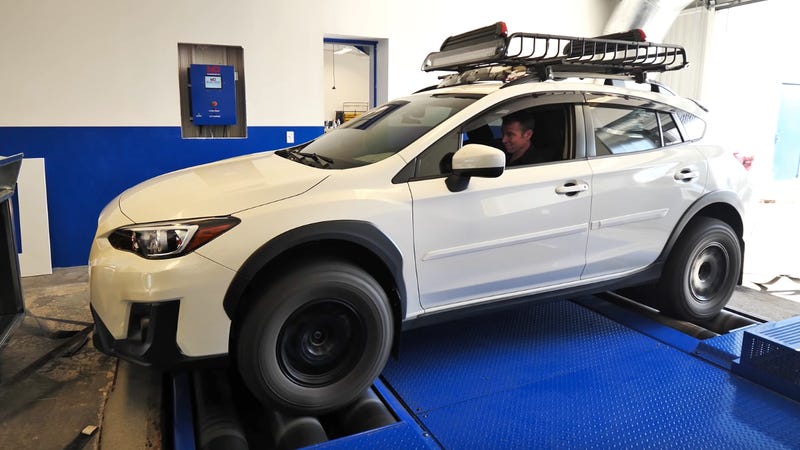
Big, beautiful all-terrain tires are key component of any off-road build, as they add ground clearance and traction. Plus, they look awesome. But they’re also going to cost you some performance, and you can see exactly how much in this dyno test.
Putting big meaty rubber on Subarus seems to be getting popular these days. We’ve seen some wild hacked-up Outbacks on off-road trails, and this particular CrossTrek owner has a big forum thread dedicated to the farkle they’ve bolted onto the little hatchback.
One of those mods includes a wheel and tire change. As the video explains, this car went from stock Subaru wheels with 225/60R17 Yokohama Geolander all-season tires, to 15-inch Method off-road wheels with 235/75R15 BF Goodrich all-terrain tires.
The upgrade will definitely add ground clearance and off-road traction. Specifically, the BFGs here are about an inch bigger in diameter than the stock Yokos. They also add weight–the video description says each corner gained 11.6 pounds of unsprung mass.
So let’s cut to the results. A stock 2018 Subaru CrossTrek is rated to make 152 horsepower and 145 lb-ft of torque at the crank. On the day this video was shot at this particular dyno, the car made 141 HP and 131 lb-ft of torque at the wheels.
Advertisement
You’ll always see lower power numbers at the wheels than you will at the crank, because of parasitic losses between the engine and the road, so that baseline seems solid.
Throw on the big BFGs and the dyno result dropped to 127 HP and 122 lb-ft of torque at the wheels.
So what the heck happened? The rotational inertia, which factors in the mass of the wheel, is likely contributing to the difference. Most simply put, heavier wheels and tires means less power realized against the road. My friend Jason Fenske from Engineering Explained went into the science there a little more completely in this 2013 video:
And of course, our own David Tracy wrote a great guide on everything you could possibly want to know about crawl ratios and off-road gearing to complete your knowledge about this stuff before you pick a new wheel for your truck, Jeep or, uh, Subaru. One key point he makes is that, even without factoring in a wheel’s/tire’s weight, increasing tire radius without re-gearing yields less force between the tire and the ground, and thus slower vehicle acceleration.
Advertisement
Now just because the CrossTrek in this video added one inch of wheel diameter and 11.6 pounds of wheel weight, then lost 14 HP and 9 lb-ft of torque at the wheels does not mean that you can extrapolate how a wheel size change will affect other vehicles.
It’s also worth noting that the testers only did one pull on this Mustang dyno with each setup. Generally, when you’re sciencing, you’re going to want to get repeatable results to make a conclusion. But this is still an interesting example of how much wheel-measured horsepower can change by changing the wheels of a car themselves.
As for the practical effects of the upsized tires on this little Subaru, I can promise you that the owner of this Subaru is not going to be making any aggressive passes any time soon. The CrossTrek’s glacial pace on stock wheels is really the vehicle’s most glaring weakness, and I can’t even imagine how slow this car is going to feel after being kneecapped by an extra 46.4 total pounds of unsprung mass. Not to mention what’s going to happen to fuel economy.
Advertisement
But hey, at least it looks badass.
If you want to get big wheels without losing acceleration, you’re going to want to mess with gearing. But like I said, if you want to learn more about that, David’s your guy.















